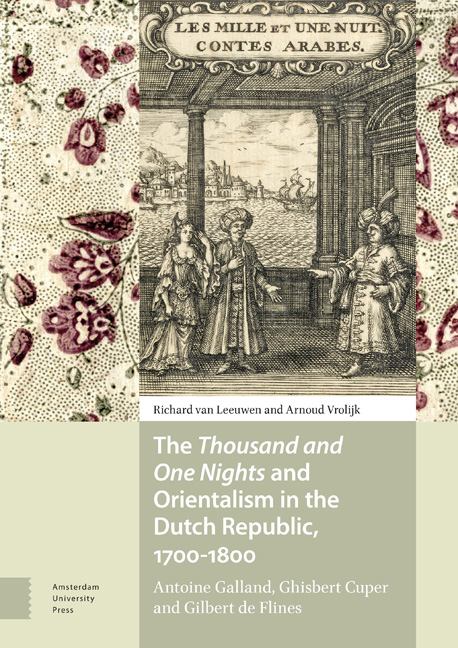 Thousand and One Nights and Orientalism in the Dutch Republic, 1700–1800
Thousand and One Nights and Orientalism in the Dutch Republic, 1700–1800 Book contents
- Frontmatter
- Contents
- Introduction
- 1 The Thousand and one nights and literary Orientalism in Europe
- 2 Dutch Orientalism before 1700
- 3 Antoine Galland and Ghisbert Cuper
- 4 The early editions of the Nights
- 5 Gilbert de Flines
- 6 Later editions in the eighteenth century
- 7 Dutch Orientalism in the eighteenth century
- Conclusion
- Appendix 1 Bibliographic survey of Dutch editions, 1705-1807
- Appendix 2 The David Coster engravings
- Appendix 3 Text samples of the Dutch Nights
- Appendix 4 French and Dutch quotations
- Illustration credits
- Bibliography
- Index
1 - The Thousand and one nights and literary Orientalism in Europe
Published online by Cambridge University Press: 21 November 2020
- Frontmatter
- Contents
- Introduction
- 1 The Thousand and one nights and literary Orientalism in Europe
- 2 Dutch Orientalism before 1700
- 3 Antoine Galland and Ghisbert Cuper
- 4 The early editions of the Nights
- 5 Gilbert de Flines
- 6 Later editions in the eighteenth century
- 7 Dutch Orientalism in the eighteenth century
- Conclusion
- Appendix 1 Bibliographic survey of Dutch editions, 1705-1807
- Appendix 2 The David Coster engravings
- Appendix 3 Text samples of the Dutch Nights
- Appendix 4 French and Dutch quotations
- Illustration credits
- Bibliography
- Index
Summary
Antoine Galland (1646-1715) was a French Orientalist and classicist who travelled to the Ottoman Empire on two occasions as a member of French diplomatic missions. During his stay in Istanbul and Smyrna he collected manuscripts and books, and his travel journals are still an important source of historical information, especially about scholarly circles and the book market. Back in France, Galland became the custodian of an important private collection of historical coins, and in 1701 he was accepted as a member of the prestigious Académie Royale des Inscriptions et Médailles. In 1709 he was offered the chair in Arabic studies at the Collège Royal (now Collège de France). His scholarly efforts were directed at the field of numismatics, which at that time belonged to the core interests of historical research, but he also published a collection of Arabic maxims and proverbs and a treatise about coffee. Apart from this, he edited the voluminous and important encyclopaedia Bibliothèque orientale which was compiled by Barthélemy d’Herbelot (1625-1695) and appeared posthumously in 1697. He completed a translation of the Qur’an, but the manuscript was lost after his death.
Galland always considered his work on the Mille et une nuit as a sidetrack to his more scholarly occupations. He received a medieval Syrian manuscript of the collection of stories from a friend in Aleppo and started to translate it in his spare time. The first volume of the translation, which appeared in Paris in 1704, was such a success that the publisher, the widow of Claude Barbin, pressured him to provide more material, upon which Galland bemoaned the irony that the audience appreciated these literary trivialities more than his more serious academic publications. After completing the translation of the manuscript, which comprised only 282 nights, Galland looked for supplementary manuscripts kept in the Bibliothèque Royale in Paris and added these stories to his translation. Moreover, he added stories he had heard from a certain Hanna Diyab, a Syrian cleric who was introduced to him by a mutual friend. Finally, a fellow Orientalist, François Pétis de la Croix (1653-1713), handed some translations of Turkish tales to the publisher which were inserted without Galland's prior knowledge in the Mille et une nuit.
- Type
- Chapter
- Information
- Thousand and One Nights and Orientalism in the Dutch Republic, 1700–1800Antoine Galland, Ghisbert Cuper and Gilbert de Flines, pp. 13 - 28Publisher: Amsterdam University PressPrint publication year: 2019


